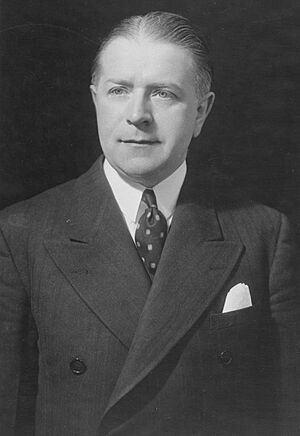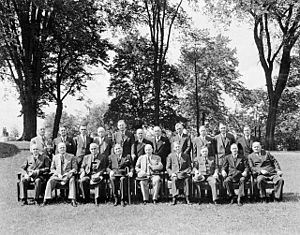Lionel Chevrier facts for kids
Quick facts for kids
Lionel Chevrier
|
|
|---|---|

Chevrier in 1945
|
|
| Canadian High Commissioner to the United Kingdom | |
| In office February 6, 1964 – March 30, 1967 |
|
| Prime Minister | Lester B. Pearson |
| Preceded by | George A. Drew |
| Succeeded by | Charles Ritchie |
| Minister of Justice Attorney General of Canada |
|
| In office April 22, 1963 – February 2, 1964 |
|
| Prime Minister | Lester B. Pearson |
| Preceded by | Donald Fleming |
| Succeeded by | Guy Favreau |
| President of the Privy Council | |
| In office April 25, 1957 – June 20, 1957 |
|
| Prime Minister | Louis St. Laurent |
| Preceded by | Louis St. Laurent |
| Succeeded by | John Diefenbaker |
| Minister of Transport | |
| In office April 18, 1945 – June 30, 1954 |
|
| Prime Minister | W. L. Mackenzie King Louis St. Laurent |
| Preceded by | Joseph-Enoil Michaud |
| Succeeded by | George Carlyle Marler |
| Member of Parliament for Laurier |
|
| In office June 10, 1957 – December 27, 1963 |
|
| Preceded by | J.-Eugène Lefrançois |
| Succeeded by | Fernand Leblanc |
| Member of Parliament for Stormont |
|
| In office October 14, 1935 – June 30, 1954 |
|
| Preceded by | Frank Thomas Shaver |
| Succeeded by | Albert Lavigne |
| Personal details | |
| Born | April 2, 1903 Cornwall, Ontario, Canada |
| Died | July 8, 1987 (aged 84) Montreal, Quebec, Canada |
| Political party | Liberal |
| Profession |
|
Lionel Chevrier PC CC QC (April 2, 1903 – July 8, 1987) was an important Canadian politician. He served as a Member of Parliament (MP) and held several key roles as a cabinet minister. He also worked as a diplomat, representing Canada on the world stage.
Contents
Early Life and Education
Lionel Chevrier was born in Cornwall, Ontario, on April 2, 1903. His father, Joseph E. Chevrier, had been the mayor of Cornwall. Lionel studied at the University of Ottawa, the University of Montreal, and Osgoode Hall. He became a lawyer in 1928. In 1932, he married Lucienne Brûlé.
Political Career
Lionel Chevrier began his political journey as a member of the Liberal Party.
Member of Parliament
He was first elected as an MP for the riding of Stormont in Ontario in 1935. He was re-elected several times in this riding. Later, in 1957, he was elected as an MP for the riding of Laurier in Quebec. He continued to serve as an MP until 1964.
Cabinet Minister Roles
Lionel Chevrier held many important positions in the Canadian government:
- From 1943 to 1945, he was a Parliamentary Assistant. This role helps a minister with their duties.
- From 1945 to 1954, he served as the Minister of Transport. This was a very important job, overseeing Canada's transportation systems.
- In 1957, he was the President of the Privy Council for a short time.
- From 1963 to 1964, he was the Minister of Justice and Attorney General of Canada. This role involves overseeing the country's legal system.
Leader of the Opposition
From 1957 to 1963, when the Liberal Party was not in power, Lionel Chevrier served as the Official Opposition House Leader. This meant he was a key leader for his party in the House of Commons.
Saint Lawrence Seaway Authority
In 1954, Lionel Chevrier left his role as an MP to become the first president of the Saint Lawrence Seaway Authority. The Saint Lawrence Seaway is a system of canals, locks, and channels that allows ships to travel from the Atlantic Ocean to the Great Lakes. This was a huge project that helped connect Canada's heartland to the world.
Diplomatic Service
In 1964, Lionel Chevrier left the House of Commons again. This time, he became the Canadian High Commissioner in London. This meant he was Canada's top diplomat, representing the country in the United Kingdom until 1967.
Military and Honours
Chevrier also had a connection to the military. He served as the Honorary Lieutenant Colonel and later as the Honorary Colonel of the Stormont, Dundas and Glengarry Highlanders, a Canadian army regiment.
In 1967, he received one of Canada's highest honours. He was made a Companion of the Order of Canada. This award recognizes people who have made outstanding contributions to the country. In 1997, Canada Post even issued a stamp in his honour.
 | John T. Biggers |
 | Thomas Blackshear |
 | Mark Bradford |
 | Beverly Buchanan |


